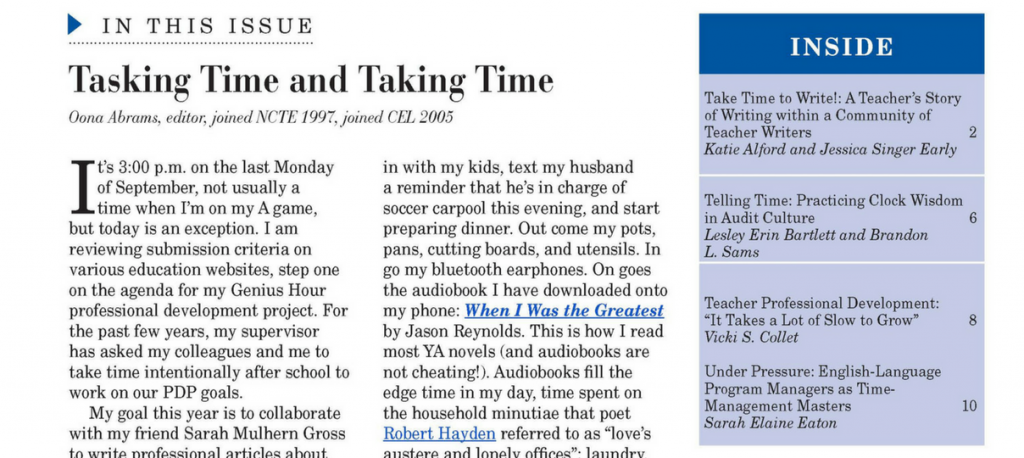This post is written by member Oona Marie Abrams, editor of English Leadership Quarterly.
It’s 3:00 p.m. on the last Monday of September, not usually a time when I’m on my A game, but today is an exception. I am reviewing submission criteria on various education websites, step one on the agenda for my Genius Hour professional development project. For the past few years, my supervisor has asked my colleagues and me to take time intentionally after school to work on our PDP goals.
My goal this year is to collaborate with my friend Sarah Mulhern Gross to write professional articles about our experiences facilitating teacher-led professional learning. Sarah’s school is “down the shore,” as we say here in New Jersey, and I teach and live in the northern part of the state. We can’t meet in person, so we talk on Voxer and work together virtually in Google Docs. At 4:00, after drafting a list of viable submission opportunities, I leave school. My discussion with Sarah on Voxer takes me halfway home. After that, I spend the remaining 30 minutes of my commute listening to Flight Behavior by Barbara Kingsolver. I’m on disc 6 of 15, but this is the road I travel every day. The book will be finished by this time next week.
By 5:00, I arrive home, check in with my kids, text my husband a reminder that he’s in charge of soccer carpool this evening, and start preparing dinner. Out come my pots, pans, cutting boards, and utensils. In go my bluetooth earphones. On goes the audiobook I have downloaded onto my phone: When I Was the Greatest by Jason Reynolds. This is how I read most YA novels (and audiobooks are not cheating!). Audiobooks fill the edge time in my day, time spent on the household minutiae that poet Robert Hayden referred to as “love’s austere and lonely offices”: laundry, cleaning, and cooking. When I finish listening to Reynolds’s novel, I decide to recommend it to my colleague Christina, since it would be a great fit for her ninth graders. The time listening to the book hasn’t been wasted.
Time is the precious commodity that all stewards of learning must protect. Small pockets, well spent, can make an incredible impact. Daily rituals, such as quick writes in the writer’s notebook, or ten minutes spent reading, can yield a fruitful harvest after just a few weeks of implementation. By the same token, each minute spent falling down the Snapchat rabbit hole or getting sucked into the Twittersphere (guilty!) can diminish our initiatives and best productive intentions. When time gets lost or wasted in school, there’s a palpable tension. For so many literacy leaders, professional time is often populated by top-down, standardized tasks that are far from inspiring or culture building. In the short term, this type of work is frustrating; in the long term, it will affect students’ learning.
I’m often asked by teachers who don’t offer reading and writing rituals in their classes how I “find the time” to address all the required curriculum if instructional time is “sacrificed” by silent sustained reading and digital writing workshop. My response? The time is invested, not wasted. When it’s time for my students to select a book they want to read or to write an assignment, they will have more clarity about how to proceed and more confidence approaching the task.
Support and practice: these factors must be in place for literacy leaders. For our time to be invested and not wasted, we must be, dare I say, ruthless in safeguarding the practices that best serve our young readers and writers.
Join the conversation @oonziela
 Oona Marie Abrams has been a high school English teacher since 1996. Editor of English Leadership Quarterly, Abrams has also been selected as an Emerging Leader Fellow by the Council on English Leadership (CEL). She resides in Bergen County, New Jersey with her husband and four sons.
Oona Marie Abrams has been a high school English teacher since 1996. Editor of English Leadership Quarterly, Abrams has also been selected as an Emerging Leader Fellow by the Council on English Leadership (CEL). She resides in Bergen County, New Jersey with her husband and four sons.

